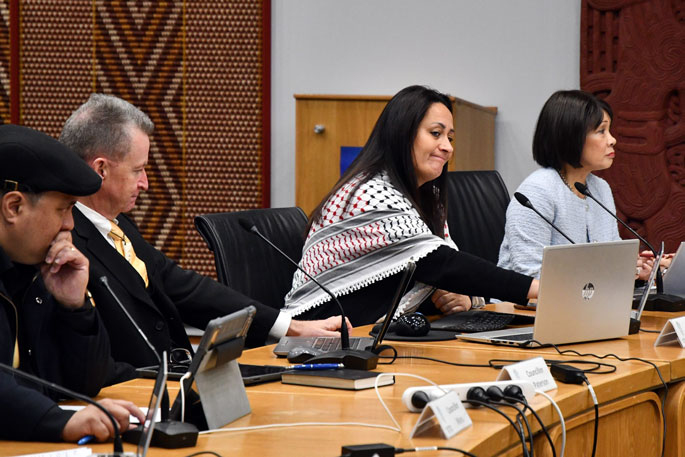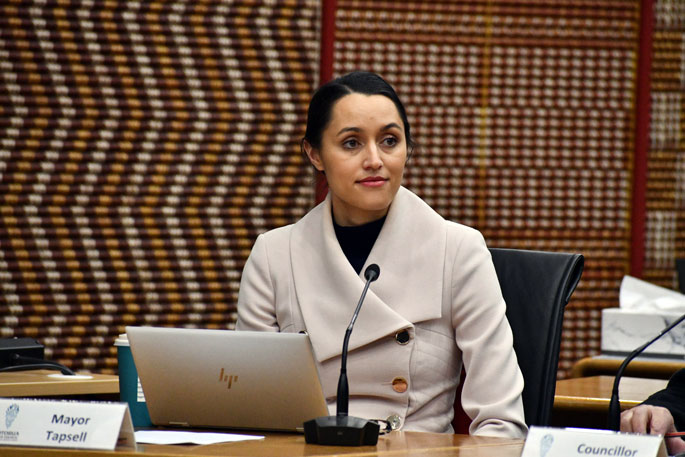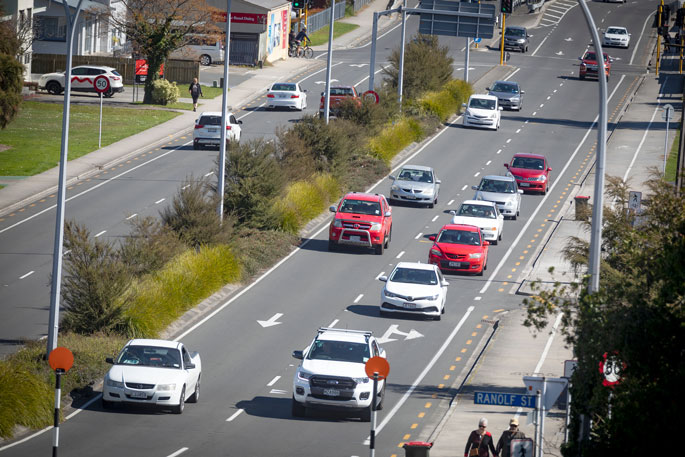Rotorua councillor Lani Kereopa has slammed a Government plan enabling local authorities to introduce a congestion charge, describing it as “imposing punitive measures on already struggling families”.
Transport Minister Simeon Brown announced last week the Government will introduce legislation this year to enable “time-of-use” schemes,, charging motorists to use certain roads at busy times.
The aim is to reduce travel times on the busiest roads and boost economic growth, Brown says in a statement.
Kereopa tells Local Democracy Reporting she believes charging families for travelling to work, school, the supermarket and home again is “not the answer”.
Kereopa says she supports lowering the number of single-occupancy vehicles to reduce transport emissions.
In her view, the Government needs to first invest in connecting towns, cities and communities with “comfortable, affordable and efficient” electric buses, trolleys and rail systems, as well as accommodating cycling options and walking.
Congestion charges in cities such as London and Milan work because they have existing extensive urban transport services, she says.
“The on-demand, Uber-like ride-sharing bus service currently being trialled in Tauranga and the proposed reintroduction of interregional passenger rail services linking Auckland, Hamilton and Tauranga are the only public transport initiatives I’m aware of being funded in the Bay of Plenty that actually positively support getting people out of cars.”
 Rotorua councillor Lani Kereopa at a July meeting. Photo / Laura Smith.
Rotorua councillor Lani Kereopa at a July meeting. Photo / Laura Smith.
The $1.9 million trial of an on-demand bus service was launched in Tauranga South in March to enhance public transport flexibility and sustainability.
The service has a fleet of minivans and users request pick-up and drop-off locations via an app.
“Improving transport network efficiency should not mean imposing fines on hard-working taxpayers to prioritise the use of our roads to support big business to move freight around the country,” says Kereopa.
She believes “the root of the problem” is a continued focus on what she views as unsustainable growth and demand “to meet obsolete measures of progress”.
In her view, four-day working weeks and universal basic incomes would be better ways to support citizens, get them off congested roads and reduce travel times.
Rotorua Mayor Tania Tapsell says the proposal is irrelevant to Rotorua in the “foreseeable future”.
She sees how it could benefit bigger cities suffering congestion and road capacity issues and needs to raise funds for transport solution investment.
Tapsell agrees with the intention but says it's important it's not seen as a solution to underinvest in local transport networks.
Tapsell doesn't support introducing time-of-use charging to Rotorua as the city doesn't currently experience, or expect, severe traffic congestion issues.
“It’s not needed and will be an additional cost on our locals.
“I would be concerned if this applied without an evidence-based approach as it punishes commuters trying to drop off kids and get to work during peak times.”
With few alternative routes to get through town, people will have little choice but to accept new charges.
 Rotorua mayor Tania Tapsell. Photo / Laura Smith.
Rotorua mayor Tania Tapsell. Photo / Laura Smith.
Tapsell says long-term congestion issues may develop on state highways through Ngongotahā and the east side of town, but she doesn't believe charging is a “sustainable solution”.
The council will continue advocating for further NZ Transport Agency investment in improving the highways.
In addition to residents, places like Rotorua also host up to three million visitors a year and needs “appropriate enabling infrastructure for economic growth”.
Tapsell says any charge introduced will need to consider the community’s income and needs - what suits Tauranga or Auckland may not be affordable for Rotorua locals.
Any additional cost imposition must meet an appropriate cost/benefit assessment.
How time-of-use charges work
Time-of-use schemes aim to improve traffic flows and shorten journey times by charging road users at certain times or locations, depending on how busy the roads are.
Local councils will propose schemes and New Zealand Transport Agency Waka Kotahi will design them in partnership with the councils.
The Government will also be able to propose a scheme through NZTA. A proposed scheme must be consulted with the public before being submitted to ministers for approval.
Brown says, in a statement, that time-of-use schemes will need to consider the impacts on motorists and businesses that use the roads within the charging areas, and the impacts on the wider network.
“Any money collected through time-of-use charging will also be required to be invested back into transport infrastructure that benefits Kiwis and businesses living and working in the region where the money was raised,” Brown says.
“Councils will not be able to spend this money on other priorities or pet projects.”
The Government expects to introduce a bill to Parliament before the end of the year.
Brown was approached for further comment.
LDR is local body journalism co-funded by RNZ and NZ On Air.




3 comments
100% correct
Posted on 22-08-2024 11:35 | By an_alias
Its just another TAX on the many taxes we already pay.
More revenue
Posted on 22-08-2024 13:58 | By Paul W2
Great. I can see most city councils jumping on this idea as a new source of revenue. I believe that the infamous four from Tauranga were looking at this before they departed.
Lani Kereopa…
Posted on 23-08-2024 10:37 | By Shadow1
….you’re so right. Congestion Charges can work well in really big cities, Singapore also comes to mind with fantastic metro coverage as well as really inexpensive taxi services.
The cost of cameras, signage and monitoring of traffic within the designated areas would be prohibitive. Any council that believes it would be a cash cow is mistaken.
They needn’t claim that the point is to reduce congestion because there are better ways to do it. Having more traffic lights can work but they have to be set up and coordinated better.
Shadow1
Leave a Comment
You must be logged in to make a comment.